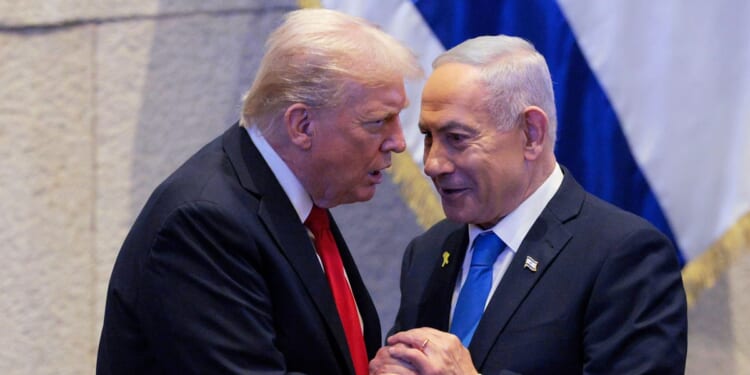AN EXTRAORDINARY phone call appears to have clinched last week’s Gaza peace deal. It occurred last month, just after Israel bombed the Qatari capital, Doha, in an attempt to assassinate the leaders of Hamas who were there for peace talks.
President Trump was furious. Qatar, home to the biggest US military base in the region, is a key American ally. Benjamin Netanyahu had gone too far. When Mr Trump and Mr Netanyahu met shortly afterwards in the White House, the US President rang the Qatari Prime Minister, passed the phone to Mr Netanyahu, and told him to apologise.
The act made the Israeli PM realise that he could not count on the unconditional support of President Trump in the way in which he had with President Biden. Israeli newspapers reported that Mr Trump had threatened to cut off the supply of American arms.
Suddenly, President Trump looked scarier to Mr Netanyahu than did the far-Right extremists in the Israeli coalition Cabinet. That, combined with the increased pressure from the hostage families, unanimous international condemnation, and the coalescence of Muslim countries — including Egypt, Turkey, and Saudi Arabia — outraged at the bombing of Doha forced the Israeli PM to acquiesce in the Trump ceasefire deal.
The phone call had a massive impact on Hamas. Its leaders had already noted that President Trump could play hardball when he publicly instructed Israeli planes to “turn round and head home” in the middle of a bombing raid on Tehran. It made Hamas believe him when he guaranteed that Israel would not restart the war if they agreed to his 20-point plan. Faced with the imminent escalation in Israel’s relentless assault on Gaza, Hamas clearly saw the deal as a way to avoid full military defeat and regroup.
Of course, in the Knesset, Mr Netanyahu dressed up the deal as a victory, in a speech that felt like the start of his 2026 election campaign. Speaking later in Hebrew to a domestic audience, he insisted that there would be no Palestinian state and promised that the Israeli army would stay in most of Gaza.
We must expect double-dealing from Hamas, too. They have released the 7 October hostages, but they have not accepted President Trump’s requirement that they lay down their arms, saying only that they are willing to discuss the topic. On the ground, thousands of Hamas gunmen are on the streets, setting up checkpoints, fighting battles with rivals, meting out summary executions of Palestinians who, they claim, have collaborated with Israel.
President Trump, thanks to the advice of Britain’s Jonathan Powell — who negotiated with the IRA to reach the Good Friday peace accord in Northern Ireland — has sketched out a process that could work. There are no dates attached to the decommissioning process. Hamas will be barred from government in Gaza, but individual members of the organisation may not be excluded — as the IRA man Martin McGuiness was not in Belfast.
Still, the Trump plan is only a sketch. The practicalities of disarming Hamas, bringing in peacekeeping troops, and setting up an administration of Palestinian technocrats have yet to evolve. The elation, excitement, emotion, and euphoria that have marked this extraordinary ceasefire could quickly evaporate if President Trump now merely declares victory and walks away.

















